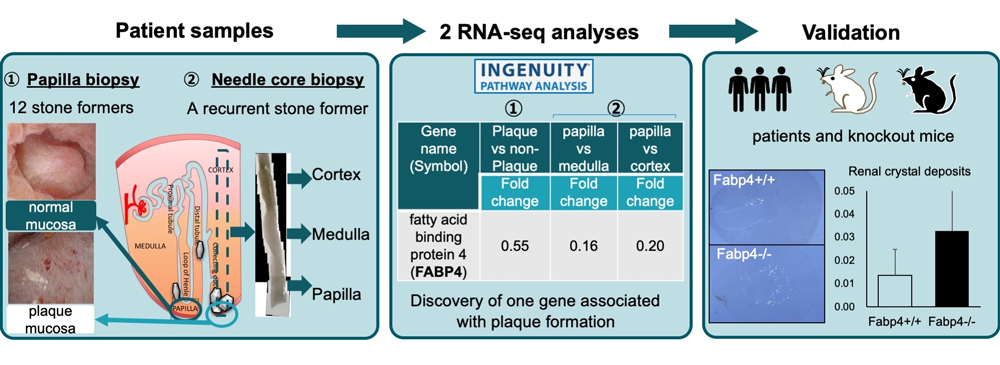Identifying fatty acid-binding protein 4 as a responsible gene for renal stone formation
March 23,2020
Kidney stone disease has a high prevalence worldwide, ranging up to 13% in North America, 9% in Europe, and 5% in Asia. They are painful for patients, often lead to surgery, and impart a significant economic impact. Many have reported nephrolithiasis (NL) to be associated with metabolic syndrome, but the mechanism by which they are linked is not understood. This poorly characterized association affords an opportunity to identify new targets that may lead to medical prevention of kidney stone recurrence.
In this study, Dr. Kazumi Taguchi (Assistant Professor, Nagoya City University), Dr. Takahiro Yasui (Professor, Nagoya City University), Dr. Thomas Chi (Associate Professor, University of California San Francisco), and their collaborators investigated gene expression profiling of nephrolithiasis patients by two RNA-sequencing approaches: comparison between renal papilla tissue with and without the presence of calcified Randall's plaques, and comparison between the papilla, medulla, and cortex regions from within a single recurrent stone forming kidney. Results were overlaid between differentially expressed genes found in the patient cohort and in the severely lithogenic kidney to identify common genes.
Overlay of these two RNA-sequencing datasets demonstrated there is impairment of lipid metabolism in renal papilla tissue containing RP linked to downregulation of fatty acid-binding protein (FABP) 4. Immunohistochemistry of human kidney specimens and microarray analysis of renal tissue from a nephrolithiasis mouse model confirmed that FABP4 downregulation is associated with renal stone formation. Furthermore, they discovered that FABP4 deficiency resulted in the development of both renal and urinary crystals in a FABP4 knockout mouse model.
Their study revealed that FABP4 plays an important, previously unrecognized role in kidney stone formation, providing a feasible mechanism to explain the link between nephrolithiasis and metabolic syndrome. They concluded that FABP4 appears to be a key molecule for kidney stone formation and may prove to be a therapeutic target for their prevention.
Kidney stone disease has a high prevalence worldwide, ranging up to 13% in North America, 9% in Europe, and 5% in Asia. They are painful for patients, often lead to surgery, and impart a significant economic impact. Many have reported nephrolithiasis (NL) to be associated with metabolic syndrome, but the mechanism by which they are linked is not understood. This poorly characterized association affords an opportunity to identify new targets that may lead to medical prevention of kidney stone recurrence.
In this study, Dr. Kazumi Taguchi (Assistant Professor, Nagoya City University), Dr. Takahiro Yasui (Professor, Nagoya City University), Dr. Thomas Chi (Associate Professor, University of California San Francisco), and their collaborators investigated gene expression profiling of nephrolithiasis patients by two RNA-sequencing approaches: comparison between renal papilla tissue with and without the presence of calcified Randall's plaques, and comparison between the papilla, medulla, and cortex regions from within a single recurrent stone forming kidney. Results were overlaid between differentially expressed genes found in the patient cohort and in the severely lithogenic kidney to identify common genes.
Overlay of these two RNA-sequencing datasets demonstrated there is impairment of lipid metabolism in renal papilla tissue containing RP linked to downregulation of fatty acid-binding protein (FABP) 4. Immunohistochemistry of human kidney specimens and microarray analysis of renal tissue from a nephrolithiasis mouse model confirmed that FABP4 downregulation is associated with renal stone formation. Furthermore, they discovered that FABP4 deficiency resulted in the development of both renal and urinary crystals in a FABP4 knockout mouse model.
Their study revealed that FABP4 plays an important, previously unrecognized role in kidney stone formation, providing a feasible mechanism to explain the link between nephrolithiasis and metabolic syndrome. They concluded that FABP4 appears to be a key molecule for kidney stone formation and may prove to be a therapeutic target for their prevention.
Graphical abstract of this study
The current study consists of two RNA-sequences analyses from different patients cohorts. Then, the data were computedly analyzed for detecting a responsible gene. The gene expression was validated with human samples and a mouse model; besides, functional analysis was performed with a knockout mouse.

EurekAlert
| Title | Fatty acid-binding protein 4 downregulation drives calcification in the development of kidney stone disease |
| Author | Kazumi Taguchi,Ling Chen,Manint Usawachintachit,Shuzo Hamamoto,Misun Kang,Teruaki Sugino,Rei Unno,David T. Tzou,Benjamin A. Sherer,Atsushi Okada,Takahiro Yasui,Sunita P.Ho,Marshall L. Stoller,Thomas Chi |
| Article URL | |
| Researcher URL |


